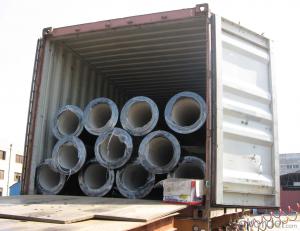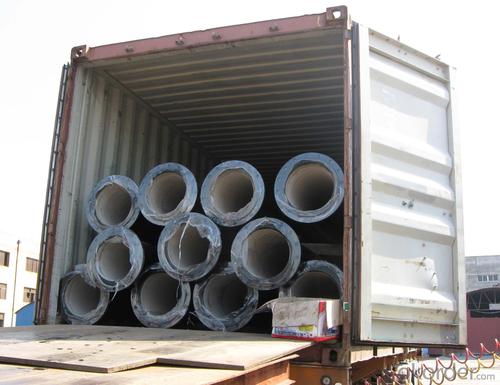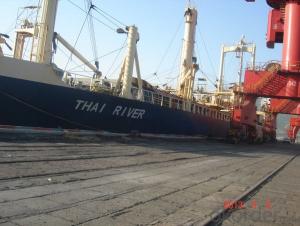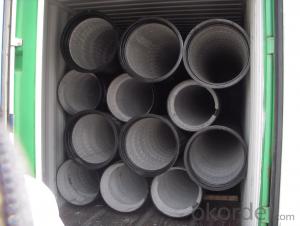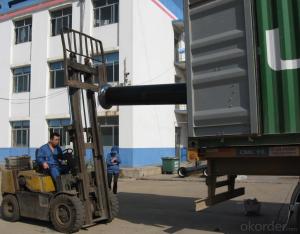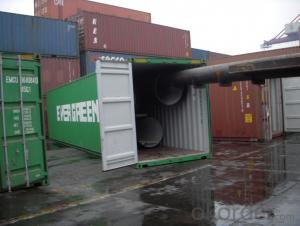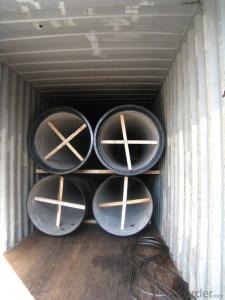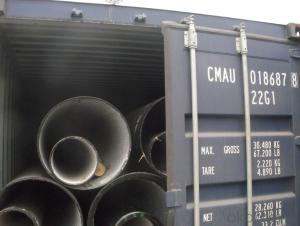DUCTILE IRON PIPE AND PIPE FITTINGS C CLASS DN600
- Loading Port:
- Tianjin
- Payment Terms:
- TT OR LC
- Min Order Qty:
- 23 pc
- Supply Capability:
- 3000 pc/month
OKorder Service Pledge
OKorder Financial Service
You Might Also Like
· Material : Ductile Cast Iron
· Size Range : DN 80mm to DN 2000mm
· Unit Effective Length : 6m or 5.7m
· Manufacture Standard: ISO 2531:1998/ EN 545:2006/EN 598:2007
· Annual capacity : 200,000 tons
· Coating Exterior: Zinc 130g/m2 according to ISO 8179-1 and bitumen coating 70 microns.
· Cement Interior: Portland Cement/ High Alumina Cement/ Sulphate Resisting Cement Lining according to ISO 4179
· Special requirements on external coating and internal lining can be applied
· We also provide accessories such as SBR/EPDM rubber gaskets, lubricant paste, pipe caps, PE sleeves, etc.
Additional Parts:
Each pipe is strictly inspected according to related standard to ensure permanently high performance.
Easy Installation at site and service free for life
Long Service Lifespan
Quotation will arrive you within 24hours once we get your inquiry.
We guarantee offering you a competitive price.
A copy of original inspection reports of pipes will be offered after shipment.
Photos of loading process will be sent to the customer after shipment effect.
We will follow-up the delivery progress after shipment effect and update to the customer on weekly basis.
- Q: What new technologies are there for the installation of ductile iron pipes?
- Type W: type W tube in the same pipe with high strength, low noise, good fireproof performance, long service life, with the characteristics of flexibility and good seismic performance, but also has synchronous construction, utilization rate is high, easy to pipe, reducing the hydraulic test of pipeline clearing times, shorten the construction period to improve economic benefits. In addition, this type of interface with bolts in the lateral fastening, avoids the defects of socket flexible interface flange is easy to damage, close to the wall to the fixed bolt, has the advantages of simple operation, so in the selection of building drainage pipes and fittings, with strong competitiveness. In addition, because the length of W pipe is 3M, the number of intermediate joints is greatly reduced, and any length can be intercepted in accordance with the requirements, thereby greatly saving the pipe material, reducing consumption and cost. W type socket with stainless steel hoop rib clamp, lined with rubber ring flexible connection, seismic performance and good sealing performance, no leakage and allowed to swing in a certain range. Therefore, W tubes are widely used both at home and abroad.
- Q: How are ductile iron pipes protected against external soil loads?
- Ductile iron pipes are protected against external soil loads through several methods. One of the primary methods is the use of a protective coating on the exterior surface of the pipe. This coating acts as a barrier between the iron pipe and the surrounding soil, preventing direct contact and reducing the risk of corrosion. Another method of protection is the use of trench backfill materials. The soil used for backfilling is carefully selected and compacted to provide adequate support and load distribution for the pipe. This helps to minimize the stress and pressure exerted on the pipe by the surrounding soil. Additionally, the design and installation of the pipe system play a crucial role in protecting ductile iron pipes against external soil loads. The pipes are typically laid in a properly engineered trench, which includes appropriate bedding and backfilling techniques to ensure stability and minimize the potential for damage. Furthermore, the use of proper pipe jointing techniques is essential for protecting against external soil loads. Joints are often designed to be flexible, allowing for some movement and accommodating external loads. This helps to distribute the stress along the length of the pipe and prevents concentrated pressure points that could lead to failure. Overall, a combination of protective coatings, appropriate backfill materials, proper installation techniques, and joint design contribute to the effective protection of ductile iron pipes against external soil loads. This ensures the longevity and reliability of the pipe system, even in challenging soil conditions.
- Q: Can ductile iron pipe be used for gas distribution systems?
- Yes, ductile iron pipe can be used for gas distribution systems. Ductile iron is a strong and durable material that is resistant to corrosion, making it suitable for underground applications. It has been widely used in gas distribution systems for many years due to its ability to withstand high pressure and provide a reliable and long-lasting solution. Additionally, ductile iron pipes are known for their flexibility, which allows for easier installation and maintenance. However, it is important to ensure that the specific requirements and standards of gas distribution systems are met when using ductile iron pipes to ensure the safety and efficiency of the system.
- Q: Can ductile iron pipes be used for underground compressed air systems?
- Underground compressed air systems can utilize ductile iron pipes due to their high strength and durability. These pipes are suitable for various applications, including underground installations, thanks to their corrosion resistance. This is especially important in underground systems where moisture and other environmental factors can cause damage over time. Moreover, ductile iron pipes have the capability to withstand high pressure, making them a dependable choice for compressed air systems. However, it is crucial to ensure proper installation of the pipes, including adequate support and protection, to prevent any damage or leaks. To maintain the longevity and efficiency of the underground compressed air system, regular maintenance and inspection should also be carried out.
- Q: Can ductile iron pipe be used for chemical processing plant applications?
- Yes, ductile iron pipe can be used for chemical processing plant applications. Ductile iron is a type of cast iron that has enhanced properties, such as improved ductility and strength, which make it suitable for a variety of industrial applications, including chemical processing plants. Ductile iron pipes have good corrosion resistance, can withstand high temperatures and pressures, and are able to handle aggressive chemical substances. Additionally, ductile iron pipes are easy to install and maintain, making them a cost-effective choice for chemical processing plants. However, it is important to consider the specific requirements and conditions of the chemical processing plant when selecting piping materials, and consult with experts to ensure that the chosen materials are suitable for the specific chemical processes and substances involved.
- Q: How does ductile iron pipe perform in areas with high groundwater salinity?
- Due to its inherent resistance to corrosion, ductile iron pipe is highly effective in areas with high groundwater salinity. The presence of elevated levels of salt and minerals in the groundwater can lead to the corrosion and deterioration of certain materials, but ductile iron is highly resilient to this type of corrosion. Its composition and manufacturing process make it less susceptible to damage from corrosive elements found in high salinity water. The primary reason for the corrosion resistance of ductile iron pipe lies in its protective iron oxide coating, which naturally forms on both the interior and exterior surfaces of the pipe. This coating acts as a barrier, preventing direct contact between the pipe and the corrosive elements present in the groundwater. Additionally, ductile iron pipes are often lined with cement mortar or a protective epoxy coating, further enhancing their resistance to corrosion and providing an extra layer of protection. Moreover, ductile iron pipe boasts an extended lifespan, often surpassing 100 years, making it an ideal choice for areas with high groundwater salinity. Its durability and resistance to corrosion ensure that it can withstand the harsh conditions associated with high salinity environments, minimizing the frequency of repairs or replacements. In conclusion, ductile iron pipe is an exceptional option for areas with high groundwater salinity due to its corrosion resistance properties. Its protective iron oxide coating, along with optional linings, offers a dependable and long-lasting solution, guaranteeing the integrity and performance of the pipe system even in demanding environments.
- Q: Can ductile iron pipe be used for hydropower systems?
- Yes, ductile iron pipe can be used for hydropower systems. Ductile iron pipes are known for their strength, durability, and high-pressure capabilities, making them suitable for transporting water in hydropower systems. Additionally, ductile iron pipes have excellent corrosion resistance, which is crucial for long-term use in water-based applications.
- Q: How is ductile iron pipe protected against external corrosion?
- Ductile iron pipe is protected against external corrosion through a variety of methods that ensure its durability and longevity. One common method is the application of protective coatings. The pipe is typically coated with a layer of zinc or asphaltic material, which acts as a barrier between the iron pipe and the surrounding environment. This coating helps to prevent direct contact between the pipe and corrosive elements such as soil, moisture, and chemicals, thereby reducing the risk of corrosion. Additionally, ductile iron pipes are often wrapped with a layer of polyethylene or polypropylene tape. This tape provides an extra layer of protection against external corrosion by serving as a physical barrier that shields the pipe from moisture and other potentially corrosive substances. The tape is applied with care to ensure complete coverage and adherence to the pipe's surface. Furthermore, cathodic protection is commonly employed to safeguard ductile iron pipes against external corrosion. This technique involves the installation of sacrificial anodes or impressed current systems near the pipe. These anodes generate a protective electrical current that counteracts the corrosion process, effectively inhibiting the deterioration of the pipe's surface. Lastly, proper installation practices play a crucial role in preventing external corrosion. It is essential to ensure that the pipe is buried at an appropriate depth, allowing for adequate soil coverage. This helps to minimize exposure to corrosive elements and maintain the integrity of the protective coatings. Additionally, proper backfilling techniques and the use of corrosion-resistant bedding materials can further enhance the pipe's resistance to external corrosion. In conclusion, ductile iron pipe is protected against external corrosion through a combination of protective coatings, tape wrapping, cathodic protection systems, and proper installation practices. These measures work together to provide a robust defense against the corrosive forces that the pipe may encounter, ensuring its longevity and reliability in various applications.
- Q: Ductile iron pipe is flexible pipe or rigid pipe
- Steel tubes, of course, because ductile iron pipes are not easily deformed.
- Q: Can ductile iron pipes be used for trenchless installations?
- Indeed, trenchless installations can utilize ductile iron pipes. Horizontal directional drilling (HDD) and pipe bursting techniques have gained considerable popularity as alternatives to the conventional open-cut trenching method for underground utility installations. Ductile iron pipes possess the necessary qualities of strength, durability, and flexibility, rendering them suitable for trenchless installations. They can endure the formidable forces encountered during HDD and pipe bursting operations without jeopardizing their structural integrity. Moreover, ductile iron pipes exhibit remarkable resistance to corrosion, establishing them as a dependable option for trenchless applications.
Send your message to us
DUCTILE IRON PIPE AND PIPE FITTINGS C CLASS DN600
- Loading Port:
- Tianjin
- Payment Terms:
- TT OR LC
- Min Order Qty:
- 23 pc
- Supply Capability:
- 3000 pc/month
OKorder Service Pledge
OKorder Financial Service
Similar products
Hot products
Hot Searches
Related keywords
